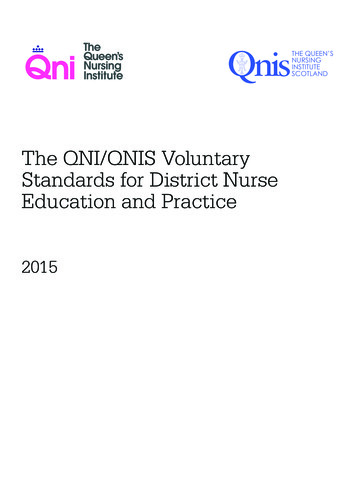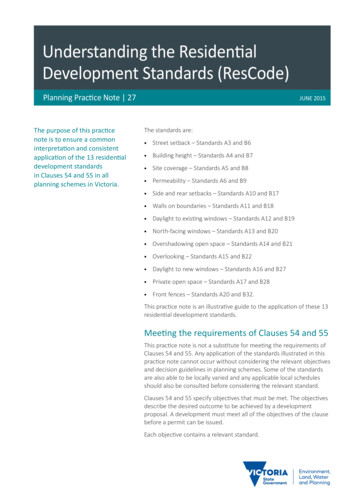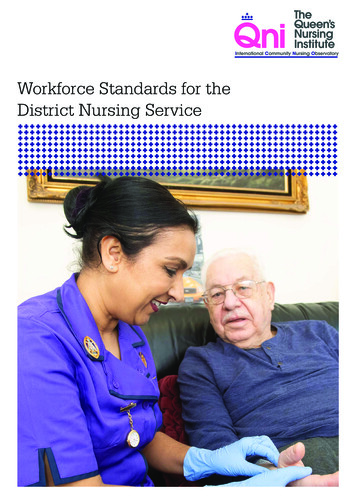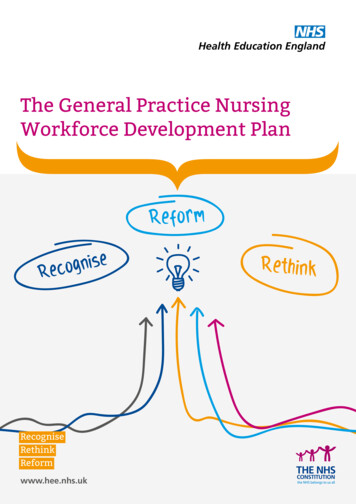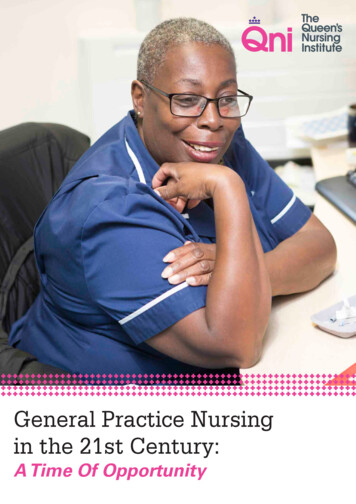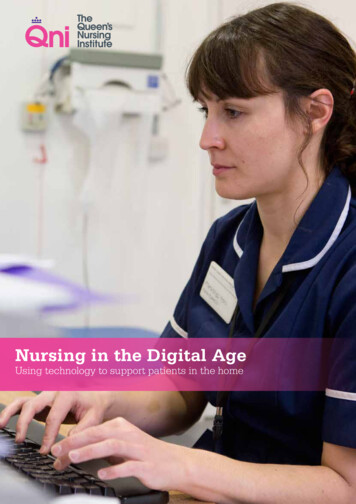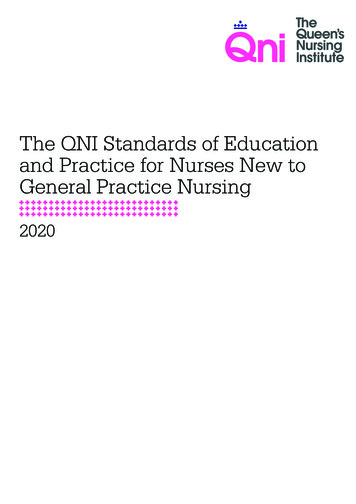
Transcription
The QNI Standards of Educationand Practice for Nurses New toGeneral Practice Nursing20201
IntroductionThe Queen’s Nursing Institute (QNI) was commissionedby NHS England (NHSE) to develop a set of voluntarystandards of education and practice to support nursesnew to General Practice Nursing (GPN). The developmentof the standards is in response to the requirements of theNHSE General Practice Nursing document ‘Developingconfidence, capability and capacity: Ten point actionplan for General Practice Nursing’ (NHSE, 2017). Theten point plan put in place investment of 15 millionfrom the General Practice Forward View (GPFV) funding(NHSE, 2016) to support action to address the significantworkforce challenges and to support improvements inGeneral Practice Nursing by 2020.Leading experts in General Practice Nursing includingGPNs, Higher Education Institution (HEI) programmeleads, training hub leads and current GPN students haveworked together to develop these standards that makeexplicit the practice expectations for a level 5 registerednurse new to General Practice Nursing. A principal aimof the standards is therefore to provide guidance intheir new role. In line with the current Health EducationEngland (HEE, 2015) ‘District Nursing and GeneralPractice Nursing Education and Career and DevelopmentFramework, the standards also aim to guide educationproviders developing introductory GPN programmes andNursing and Midwifery Council (NMC) approved SpecialistPractitioner Qualification (SPQ) programmes that underpinthe expected knowledge and skills for General PracticeNurse education and practice.These standards have been designed to provide acontemporary and structured overview of expected bestpractice, standards and guidance for nurses embarkingon the General Practice Nursing career pathway. They area precursor to the QNI/QNIS (2017) ‘Voluntary Standardsfor General Practice Nursing Education and Practice’,which provide the foundation for the next stage of a GPNcareer as a senior nurse. The term ’voluntary standards‘differentiates them from regulatory or mandatorystandards, such as those set by the NMC.General Practice NursesWith the inception of Primary Care Networks andpublication of the NHS Long Term Plan (NHSE/I, 2019) andthe proposed investment and focus of more health careservices moving from hospitals to primary and communitycare, this is an exciting time for nurses choosing a careerin General Practice Nursing. The evolving role of theGeneral Practice Nurse (GPN) with specialist knowledgeand skills is pivotal in contributing to the success of thistransformation of primary care services. However, thisbrings unique challenges for nurses selecting GeneralPractice Nursing as a new career choice as many GPNs aredirectly employed by General Practitioners with variations2in roles, responsibilities, terms and conditions, in additionto variances in role preparation and continuing professionaldevelopment opportunities. Thus, future GPN educationprogrammes need to sufficiently prepare the registerednurse with the contemporary specialist knowledge andskills to fulfil the role as a GPN. They must also offerconsistency, as current GPN education provision acrossEngland varies widely in length, level of qualification andexpected clinical competence.Aim of the standardsThese standards have been designed and developed toreflect best practice and provide guidance to preparenurses for their new role as a Registered Nurse in GeneralPractice Nursing, in addition to: Providing the public with a contemporary descriptionof the role of a Registered Nurse new to GeneralPractice Nursing;Providing an overview of the key practice andeducation requirements of the GPN role for nursesnew to General Practice Nursing;Supporting and guiding universities in developingfuture education programmes which are focussed onagreed best practice;Enabling nurses new to General Practice Nursing tobe able to articulate their role and the value of theirrole;Providing a framework for service commissioners,education commissioners, training hub leads, GeneralPractitioner employers and other providers in planningprimary care nursing services.Following the publication of the QNI/QNIS GPN VoluntaryStandards for General Practice Nursing Education andPractice in September 2017, this project (outlined inAppendix 1) and outcomes from the subsequent surveyof current academic Introductory General PracticeNurse programmes, identified stark inconsistencies inthe academic and practice preparation programmes forRegistered Nurses new to General Practice Nursing. Inlight of the additional inconsistencies in introductory GPNprogramme length and academic level, there has beena consensual recognition for agreed standards to informfuture GPN roles and to ensure a consistent approach tothe practice and educational preparation of nurses new toGeneral Practice Nursing.A collaborative consultation with Higher EducationInstitution (HEI) programme leads, training hub leads,GPNs, student GPNs and an expert patient, has led tothe development of these standards. They do not focuson discrete clinical skills, as it is expected that these areassessed in the clinical environment using the nationallyrecognised Royal College of General Practitioner (RCGP),General Practice Foundation/RCN General Practice Nurse
Competency Framework (RCGP, 2015) or equivalent.These voluntary standards for nurses new to GeneralPractice Nursing have been drafted encompassing fourkey domains of:1.2.3.4.Clinical CareLeadership and ManagementFacilitation of LearningEvidence, Research and Development.Using the standardsCurrent General Practice Nurse education is notmandatory and these standards are not set to prescribeacademic levels or how introductory GPN programmesshould be delivered, as this will be determined by localnegotiation. However, it is anticipated that HEIs willadopt these voluntary standards as a best practice guidein developing future ‘Introduction to GPN’ programmes,as the current educational content of GPN programmesand training vary in length and content across England. Topromote consistency, the standards provide a frameworkfor developing future education programmes which arefocussed on agreed best practice.To ensure quality, safety and retention of new GPNs thedevelopment of these standards serve as an opportunity torecommend that service commissioners, GPN employersand organisations recognise the importance of a wellconsidered minimum period of induction, supervision andpreceptorship for any NMC Registered Nurse enteringGeneral Practice Nursing, that includes: A minimum of a one week period of orientation; A minimum one month induction period withimplementation of the General Practice NursingInduction Template (NHSE, 2019); A period of preceptorship with an identifiedexperienced GPN Practice Supervisor and an identifiedGPN Practice Assessor (NMC, 2018) usually employedin the same General Practice; Completion of a HEI accredited introductoryprogramme for nurses new to general practice of atleast six months, within their first year; Assessment of clinical competencies utilising acompetency framework with the RCGP competenciesfor GPNs (RCGP, 2015) or equivalent competencyframework, by a Practice Assessor usually employedin the same General Practice.Voluntary Standards for Nurses New to GeneralPractice Nursing Education and Practice.At the end of a programme mapped against the new QNIVoluntary Standards, nurses new to General PracticeNursing will be able to:Domain 1: Clinical Care1.1 Evidence a working knowledge of the practicepopulation demographics and health needs for patientsacross the age range and four fields of nursing (AdultNursing, Childrens Nursing, Learning Disabilities Nursingand Mental Health Nursing) within the practice and acrossthe Primary Care Network, to inform evidence-based carepathways.1.2 Demonstrate effective communication skills and abilityto foster therapeutic relationships with patients enablingpatients with specific needs to know they have beenlistened to with respect and compassion.1.3 Demonstrate effective communication with allmembers of the multidisciplinary team in order to ensurea safe, effective and seamless care pathway.1.4 Utilise contemporary evidence-based consultation toolsand develop effective consultation skills in assessment,implementation and evaluation of health care outcomes ina safe and time effective manner.1.5 Identify signs of deteriorating ill health and recognitionof the connection between physical and mental healthissues, acknowledging the complexities across the agerange of the population.1.6 Demonstrate the role of the General Practice Nurseas an autonomous practitioner in promoting personalisedcare, initiating social prescribing, care managementplans and anticipatory care, acknowledging the supportstrategies available.1.7 Practise in an inclusive way ensuring that individual’srights, beliefs and culture are considered when supportingtheir health choices in the primary care setting.1.8 Develop effective problem solving, influencing andnegotiation skills and adopt a partnership approach whenundertaking person centred consultations (individual orgroup), fostering a culture of self-care.1.9 Ensure optimal patient care, identify health promotionopportunities and facilitate behaviour change witheducation and support, enabling shared decision makingto ensure person-centred care.3
1.10 Identify when additional expertise or referral to otherspecialist services is necessary, initiating objective andappropriate referrals using recognised assessment andreferral pathways and best interest decision-making.1.11 Engage with and work in partnership in the PrimaryCare Network, including the voluntary and third sectorto promote the health and wellbeing of the practicepopulation and ensure that public health needs of thecommunity are addressed.1.12 Demonstrate a broad range of evidence informedclinical expertise and competently undertake the rangeof skills required within the scope of the general practicenurse role and responsibility.1.13 Engage in diagnostic health screening, healthsurveillance and therapeutic techniques applied toindividuals and groups across the practice population.1.14 Demonstrate effective decision-making skills toensure that quality care is provided to people, families andcarers experiencing a range of complex health care issues.1.15 Demonstrate an evidence-based knowledge ofcommon clinical conditions presented in primary care tobe able to support and respond to the needs of peoplewith multi-morbidity.1.16 Demonstrate and utilise risk management strategiesin the General Practice setting and take account ofindividual’s responsibilities, whilst promoting patient andstaff safety and preventing avoidable harm.1.17 Develop specific GPN clinical competence utilisingthe GPN Induction template and the nationally agreedRoyal College of General Practice Foundation/RCN GeneralPractice Nurse Clinical Competency Framework (RCGP,2015) or equivalent.1.18 Ensure a reflective, enquiring, critical and innovativeapproach is adopted to inform accurate decision makingin practice, identifying variation in individuals and ensuringcorrect referral and management pathways are followed.1.19 Adhere to Nursing and Midwifery Council (NMC)standards and revalidation requirements, demonstratingreflective practice that enables critical analysis of personalpractice.1.20 Engage with and utilise digital technologies to ensureefficiency and effectiveness of communication within thePrimary Care Network.1.21 Engage and use digital technologies to supportpatient self-care.4Domain 2: Leadership and Management2.1 Articulate the context of the general practice setting,appraising the role and responsibilities of the GeneralPractice Nurse and individual staff within the Primary CareNetwork.2.2 Identify the unique characteristics and professionalissues within General Practice, for example, the useof Patient Group Directives (PGDs), Patient SpecificDirectives (PSDs), Quality and Outcomes Framework(QOF) and professional indemnity arrangements.2.3 Following a period of induction and preceptorshipof an appropriate length commensurate with previousexperience, knowledge and skills, demonstratecompetence and confidence in professional practice,justifying clinical decision making, within an agreed scopeof practice.2.4 Contribute to national screening programmes, auditand overall service improvement strategies that supportquality assurance.2.5 Develop leadership skills contributing to delegation ofsafe and effective distribution of workload. Articulate howempowerment, education and change management skillsensure effective resource management.2.6 Demonstrate an understanding of national and localpublic health strategies and how these align to support thehealth of the practice population, in partnership with otherdisciplines and agencies.2.7 Articulate how the General Practice Nursing team areintegral to the implementation of strategies and legislationfor example, The Long-Term Plan (DH, 2019).2.8 Contribute to supporting the General Practice Nursingteam within regulatory, professional, legal, ethical andpolicy frameworks. Promote and model effective teamleadership ensuring all staff feel valued.2.9 Promote the value of General Practice Nursingin meeting improved health outcomes and businessobjectives within the Primary Care Network.2.10 Engage with learning and development opportunitiesto enhance personal and professional development in linewith current evidence.2.11 Contribute to the assessment and supervision ofother health care professionals (HCPs) where applicableand implement appropriate strategies when escalatingconcerns with staff performance to senior clinical staff.2.12 Evidence knowledge of socio-political and economic
policies and drivers that impact on the practice populationand wider community. Analyse how these may impacton the design and delivery of General Practice Nursingservices in meeting the needs of the practice population.2.13 Identify vulnerable adults and children ensuring allteam members understand their responsibilities in termsof safeguarding legislation, policies and procedures.2.14 Understand the range of change managementstrategies and the way in which they support the team torespond flexibly and innovatively to changing contexts ofcare.Domain 3: Facilitation of learning3.1 Analyse the NMC (2018) Standards for StudentSupervision and Assessment (SSSA). Advocate andincorporate the roles of Practice Supervisor and PracticeAssessor within the General Practice Nursing learningenvironment.3.9 Locate and participate in clinical supervisionopportunities, fostering a culture where clinical supervisionis valued and applied to all levels of staff.Domain 4: Evidence, Research andDevelopment4.1 Locate contemporary evidence-based literature toinform and implement best practice within the complexand unpredictable health and social care environment ofGeneral Practice Nursing.4.2 Participate in the development of evidence-basedguidelines for the practice and Primary Care Network andsupport staff to ensure all care is evidence informed andbased on best practice.4.3 Contribute to the development, collation, monitoringand evaluation of data relating to service provision anddevelopment, evaluating the impact on quality assuranceand improvement.3.2 Support the development of a safe and effectivepractice learning environment for nursing and other clinicalstudents, and contribute to ensuring sufficient supportand supervision is in place.4.4 Participate in the development of innovative practicethat meets the needs of individuals through patientparticipation groups, valuing feedback that enablespatients to share their experiences of care confidentially.3.3 Demonstrate effective professional and clinicalleadership in general practice, supporting and supervisingstudents and providing constructive feedback on theirprogress and achievements.4.5 Adhere to duty of candour and contribute to thesystematic improvement of services in response topatient feedback.3.4 Participate in evaluating the impact of educational andpractice interventions for the students, staff and patients.4.6 Adhere to governance systems in place for GeneralPractice Nursing staff to ensure patient follow up, referrals,correspondence and safety alerts are actioned.3.5 Contribute to developing systems to assess thelearning and development needs of junior staff in theGeneral Practice Nursing team and negotiate strategieswith the practice to meet these needs.3.6 Demonstrate the skills that support learning andassessment for undergraduate nursing students, HealthCare Support Workers, Assistant Practitioners and NursingAssociates in clinical learning environments.3.7 Role model non-judgemental and value-based care inpractice creating a culture of openness and recognitionof the duty of candour, promoting these values in othermembers of the General Practice Nursing team.3.8 Evaluate personal learning and development throughreflective practice to enable critical analysis of personalpractice as a new GPN through the appraisal process anddevelopment of a personal development plan.ReferencesHealth Education England (2015) District Nursing and General Practice Nursing Service:Education &Career Framework ts/Interactive%20version%20of%20the%20framework 1.pdfNHS England/NHS Improvement (2017) General Practice – Developing confidence, capabilityand capacity: A ten-point action plan for General Practice Nursing fNHS England/NHS Improvement (2016) General Practice Forward View /04/gpfv.pdfNHS England/NHS Improvement (2019) General Practice Nurse Induction template. plate/NHS England/NHS Improvement (2019) The NHS Long Term Plan. /2019/08/nhs-long-term-plan-version-1.2.pdfNMC (2018) Part 2: Standards for Student Supervision and assessment.pdfNursing and Midwifery Council (2001) Post Registration Standards for Specialist Education andPractice. LondonQNI (2016) General Practice Nursing in the 21st Century: a time of opportunity. The Queen’sNursing Institute. gpn c21 report.pdfQNI (2017) The QNI/QNIS Voluntary Standards for General Practice Nursing Education andPractice. The Queen’s Nursing Institute. GPN-Voluntary-Standards-for-Web.pdfRoyal College of General Practitioner (RCGP) General Practice Foundation/RCN General PracticeNurse competency framework (RCGP, 2015) -2015.ashx?la en5
Appendix 1 - Project Background andMethodologyIn 2016 the QNI published a report: ‘General PracticeNursing in the 21st Century’ based on the responses toa survey of 3400 GPNs, which highlighted the challengesthey face in practice. Key findings included the need forclarity of the GPN role in the public domain and the needfor a national focus on GPN recruitment and retention inlight of 33.4% of GPNs reportedly planning to retire by2020. This report was able to influence the current agendafor GPNs and formed the foundation and actions of theNHSE GPN ten point action plan (NHSE, 2017).Inconsistencies in GPN education and professionaldevelopmental opportunities were identified as not meetingthe needs of the contemporary role of the GPN whichhas evolved considerably since the only professionallyapproved NMC post-registration education standardsfor GPNs were set in 1994. In 2015, Health EducationEngland (HEE) developed an educational specification forintroductory courses for nurses new to General PracticeNursing, but this has not been applied across England.The subsequent development of the 2017 QNI/QNISVoluntary Standards for General Practice NursingEducation and Practice for Senior GPNs has contributed tothe educational and development needs of senior GPNsworking in General Practice, preparing them to developtheir roles to align with new ways and models of working,introduced as part of the Five Year Forward View and the2016 General Practice Forward View. Since publication ofthe 2017 QNI/QNIS Voluntary Standards, many HEIs thateither deliver NMC approved programmes or ‘Introductionto GPN’ modules and programmes have reportedlymapped the QNI/QNIS GPN voluntary standards to theirprogrammes.Research from the development of the 2017 QNI/QNISGPN standards identified inconsistencies in the length,content, assessment, academic level and practice supportof introductory academic programmes for nurses new toGeneral Practice Nursing. In view of these findings andin response to the aim and objectives of the NHSE GPNten point plan, NHSE commissioned the QNI to undertakea project to develop standards to inform and support theeducation and practice of nurses new to General PracticeNursing.The project commenced in October 2018 and a projectmanager with in-depth knowledge and experience ofGeneral Practice Nursing and higher education wasappointed. Development of the project was based onthe same methodological approach that was taken withall the previous QNI/QNIS Voluntary Standards for Nurse6Education and Practice encompassing four key domains:1.2.3.4.Clinical CareLeadership and ManagementFacilitation of LearningEvidence, Research and Development.A survey was developed as a first line action for thedevelopment of best practice educational standards fornurses new to General Practice Nursing and to establishprovision of current introductory GPN programmes. Datacollated yielded 26 responses and identified that 11 HEIsprovide the GPN Specialist Practitioner Qualification(SPQ); 9 in England and 2 in Wales. No NMC approvedGPN programmes were identified in Scotland or NorthernIreland. The data also highlighted the inconsistencies ofcurrent introductory GPN programmes in HEIs whichrange from 4 weeks (one 30 credit module) to one yearfull-time (or 2 years part-time), based on attendance of 2academic days, 3 practice based days, completing with60 credits for Post Graduate Certificate or 120 credits atBSc or Post Graduate Diploma levels. In terms of clinicalpractice assessment, the survey data evidenced 88% ofprogrammes utilise the 2015 Royal College of GeneralPractitioners/ General Practice Foundation Competenciesfor General Practice Nurses as an exemplar framework forpractice assessment.Following data collation, the project lead receivedoverwhelming support from academic programmeleads, training hub nurse leads, GPNs and GPN students,recognising the need to establish clear standards toinform future introductory GPN programmes in England.Early face-to-face focus groups and consultationsestablished inconsistencies with GPN programmetitle descriptors (Fundamentals/Foundation), causingconfusion, particularly for nurses expressing an interest inpursuing a career in General Practice Nursing. Therefore,it was agreed collectively to title the standards work as:‘Standards of Education and Practice for Nurses New toGeneral Practice Nursing’ to encompass all introductoryGPN programmes on offer.The development of the project (Diagram 1) sets outagreed education and practice standards for registerednurses embarking on a career in General Practice Nursingand serve as a precursor to the 2017 QNI/QNIS VoluntaryStandards for General Practice Nursing Education andPractice for GPNs. It is anticipated that this project work willinform the 2019/2020 NMC consultation review of currentNMC approved post-registration education and practicestandards and to provide support for the development offuture HEI introductory GPN programmes.
To address the inconsistencies in the length of currentintroductory GPN programmes, and to ensure sufficientlyrobust education and practice preparation for nurses newto General Practice Nursing, there need to be agreedrecommendations with HEIs and stakeholders. In light ofthe extensive consultation to develop these standards,and for sufficient time to develop the knowledge, skillsand competence to meet the standards, the minimumrecommended length of future introductory GPNprogrammes should be 6 months, with a minimum periodof induction and a robust period of preceptorship in place.For those seeking career development to lead and manageGeneral Practice Nurses and others, they may refer to the2017 QNI/QNIS Voluntary Standards for General PracticeNursing Education and Practice.Diagram 1. Development of StandardsSeptember 2018Literature searchIdentification of HEIsoffering Introductory/Foundation/Fundamental GPNprogrammesFace to face focus group withGPN educators and trainingleads through the Associationof Academic General PracticeNurse Educator (AAGPNE)meetingsNovember 2018 Online consultationsurvey undertakenwith HEI GPNprogramme leads85% of all respondentsincorporate clinicalassessment with theRCGP/ RCN Foundationcompetencies for GPNsFace to face focus groupmeeting with student GPNsand GPN practitioners and apatient representativeQualitative survey feedbackincorporated into standardsas appropriateMay 2020publicationFinal draft standardsapproved by QNI ChiefExecutive and NHSE PrimaryCare lead26responsesIdentified variations of GPNProgramme length between4 weeks to 1 year F/T and 2years P/TFirst draft of standardspresented to academic andprogramme leads, face toface meeting and remotereview of draft standards withpractitionersFace to face focus groupmeeting with student GPNsand GPN practitioners and apatient representative7
Appendix 2 – Project ReviewersNameRoleOrganisationDr Crystal Oldman CBEChief ExecutiveThe Queen’s Nursing InstituteSue BoranDirector of Nursing ProgrammesThe Queen’s Nursing InstituteKaren StoreyPrimary Care Nursing LeadNHS England/NHS ImprovementJason WestwoodGeneral Practice Nursing Programme NHS England/NHS ImprovementManagerMembers of the Association ofAcademic General Practice NurseEducatorsGill BeardmorePrimary Care Nurse Workforce LeadHealth Education EnglandGill BoastGPN Lead and Facilitator/SeniorLecturerEast Staffordshire ClinicalCommissioning GroupLisa ClarkeSenior Lecturer - GPN Course LeadUniversity of WolverhamptonFiona CookLecturer in Community and PrimaryCareThe Exeter School of NursingPlymouth UniversityGill CoverdaleProfessional Lead - EducationProfessional Lead - Learning andDevelopmentRoyal College of NursingSharon EvansLecturerPlymouth UniversityDonna GoddardSenior Lecturer / Pathway Lead forGeneral Practice NursingUniversity of BrightonProfessor Joy MerrellProfessor of Public Health Nursing/Athro mewn Nyrsio IechydCyhoeddusSwansea UniversityKaty SmythGPN programme lecturerUniversity of Central LancashireCatherine TulletTrainee Practice NurseTower Hamlets ClinicalCommissioning GroupAcknowledgementsLead Commissioner Paul Vaughan, Head of Perceptions and GeneralPractice Nursing, NHS England/NHS ImprovementAuthor Angie Hack, Project Manager, The Queen’s NursingInstituteSub-editors Dr Crystal Oldman CBE, Chief Executive, The Queen’sNursing Institute Sue Boran, Director of Nursing Programmes, TheQueen’s Nursing Institute Matthew Bradby, Head of Communications, TheQueen’s Nursing Institute8
www.qni.org.uk9
The Queen's Nursing Institute (QNI) was commissioned by NHS England (NHSE) to develop a set of voluntary standards of education and practice to support nurses new to General Practice Nursing (GPN). The development of the standards is in response to the requirements of the NHSE General Practice Nursing document 'Developing


